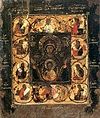

| Previous day | Next day |
| Old Style
November 27
|
Tuesday |
New Style
December 10
|
|
26th Week after Pentecost.
Tone 8.
Nativity Fast. |
Wine and oil allowed.
|
![]() Commemoration of the Miracle of the Weeping Icon of the Most Holy Theotokos “Of the Sign” at Novgorod (1170).
Commemoration of the Miracle of the Weeping Icon of the Most Holy Theotokos “Of the Sign” at Novgorod (1170). ![]() Great-martyr James the Persian (421).
Great-martyr James the Persian (421). ![]() St. Palladius of Thessalonica (6th c.-7th c.).
St. Palladius of Thessalonica (6th c.-7th c.). ![]() Uncovering of the relics of St. Vsevolod (in baptism Gabriel), prince and wonderworker of Pskov (1192).
Uncovering of the relics of St. Vsevolod (in baptism Gabriel), prince and wonderworker of Pskov (1192). ![]() St. James, bishop and wonderworker of Rostov (1392). St. Andrew Ogorodnikov, fool-for-Christ, of Simbirsk (1841). Synaxis of the New Martyrs and Confessors of Radonezh.
St. James, bishop and wonderworker of Rostov (1392). St. Andrew Ogorodnikov, fool-for-Christ, of Simbirsk (1841). Synaxis of the New Martyrs and Confessors of Radonezh.
17 Monk-martyrs in India (4th c.). St. Romanus the Wonderworker, of Cilicia, near Antioch (5th c.). St. Diodorus, founder of Yeriegorsk Monastery (Solovki) (1633).
New Hieromartyrs Nicholas (Dobronravov), archbishop of Vladimir, Nikon (Belyaev), archimandrite, of the Staro- Golutvin Monastery (Kolomna), Ioasaph (Boyev), archimandrite, of Nikolskoye Monastery (Moscow), Nicholas (Saltykov), hieromonk of the St. Nicholas-Peshnosha Monastery (Moscow), and Apollos (Fedoseyev), hieromonk, of Moscow (1937). New Hieromartyr Cronides, archimandrite, and with him Seraphim (Krestianinov), abbot, and Xenophont (Bondarenko), hieromonk, all of St. Sergius Lavra (1937).
Icons of the Most Holy Theotokos “Of the Sign”: “Kursk Root” (1295) “Of Abalak” (1637), “Of Tsarskoe Selo,” and “Of Seraphimo-Ponetaev.” (1879)
St. Pinuphrius of Egypt (4th c.). St. Palladius, bishop of Elenopolis, author of The Lausaic History (ca. 430). St. Maximus of Riez (ca. 460). St. Nathaniel of Nitria (6th c.). St. Virgil, bishop of Salzburg, Irish missionary (784).
Repose of Hieromonk Athanasius of Iveron, Mt. Athos (1973).
Thoughts for Each Day of the Year
According to the Daily Church Readings from the Word of God
By St. Theophan the Recluse

Tuesday. [II Tim. 3:16-4:4; Luke 19:45-48]
My house is the house of prayer. And indeed, just enter into a church, and it already calls you to prayer. Everything there is disposed and done in order to dispose one to and assist prayer. Therefore, if you want to stir up prayer in your heart, go more often to the church of God. At home you will not pray as you can in church. There are those who pray warmly at home too, but if they pray this way at home, how much higher is their prayer in Church? But when you are in church, be there not only in body, but rather in spirit. Stand where it is quieter, and beholding the Lord before you with your mind, pour out before Him your soul. Chase away daydreams, do not allow concerns, and heed only one job—the job of prayer. Lift up your heavy soul on high and break up its coarseness through contemplation of Divine things. If you have some [sin on your conscience], remove it from yourself through repentance and a promise of correction. If your conscience is not satisfied, add deeds of self-denial and love. Standing in church, prepare for how you will be outside of church for the rest of the time, prepare yourself to never step away from the Lord in thought, but always to see Him before you, so that your steps would not stray from the right path to the wrong one. Then, when you come to church it will be easier for you to be as you ought to be there. By standing appropriately in church it will be easier for you to hold your attention before the Lord when you are outside of church.… Thus your [state of] abiding in the Lord will grow higher and higher. What more could one desire?
Articles
 Greatmartyr James the Persian |
 Icon of the Mother of God “Kursk-Root”The Kursk Root Icon of the Mother of God “Of the Sign” is one of the most ancient icons of the Russian Church. |
 Icon of the Mother of God “Seraphim-Ponetaevka”Six years after it was painted, the icon became known for its numerous miracles and became the chief holy item of the monastery. |




